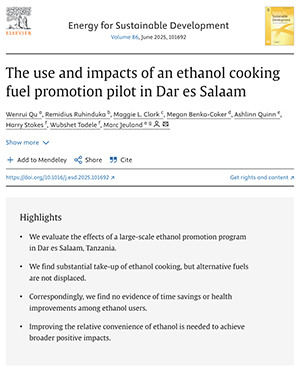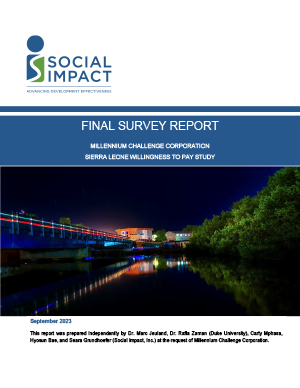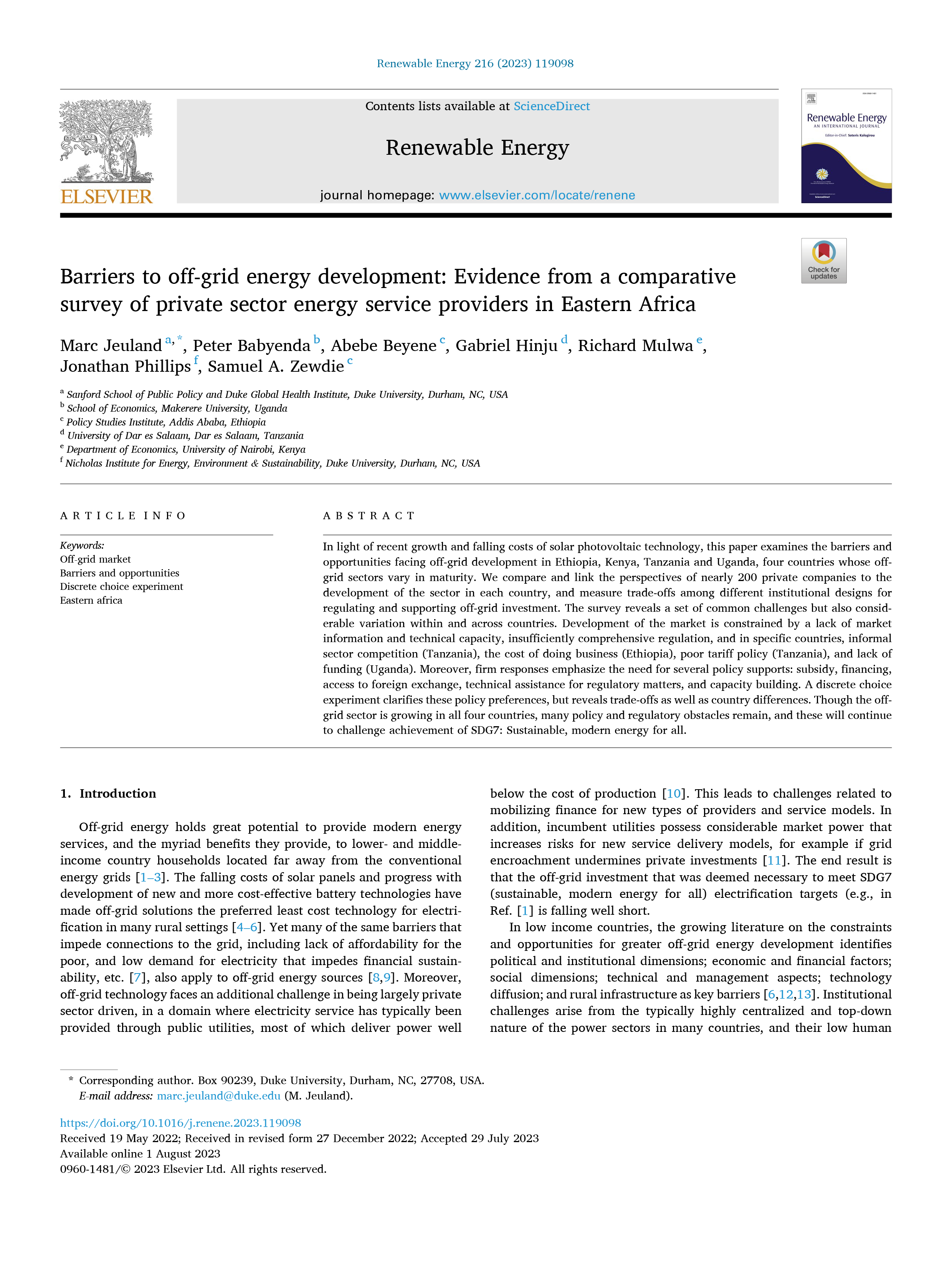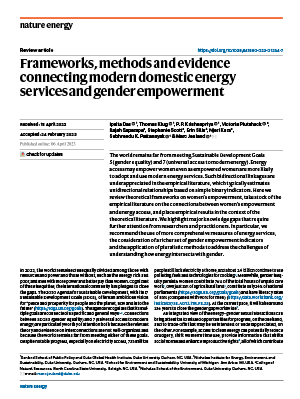Publications
The Use and Impacts of an Ethanol Cooking Fuel Promotion Pilot in Dar es Salaam
The authors evaluated the effects of a large-scale ethanol cooking fuel promotion program in Dar es Salaam, Tanzania, and found substantial uptake of ethanol cooking. However, alternative fuels were not fully replaced under this scheme. The report concludes that improving the relative convenience of ethanol as a cooking fuel is needed to achieve broader positive impacts.
Sierra Leone Compact—Willingness to Pay for Electricity: Final Survey Report
This study focuses on assessing willingness to pay (WtP) for electricity among households and businesses—both those already connected to the grid but coping with unreliable supply, and those who are expected to gain access through future grid expansion or densification. This work provides a comprehensive valuation of the benefits of both new electricity connections and enhanced reliability for current users, as well as a rich dataset on energy use, perceptions, and expenditures in the study area that could be used for policymaking or future research.
The Costs and Benefits of Clean Cooking Policies in Low- and Middle-Income Countries Under Real-World Conditions
Clean cooking technologies have the potential to deliver substantial health, environmental, climate, and gender equity benefits. We use the BAR-HAP model to conduct the first global analysis of the regional and global costs and benefits of several subsidy and financing policies supporting household transitions to cleaner technologies. The analysis provides evidence-based estimates of these interventions' impacts, while remaining conservative about factors such as stove usage, subsidy leakage, and exposure levels, for which there remains considerable uncertainty.
The Use of Plastic as a Household Fuel Among the Urban Poor in the Global South
Increasing plastic waste pollution has led to a rising prevalence of the open burning of plastic waste, especially in locations lacking formal waste-management systems. Poor, urban communities in the Global South face particularly acute challenges in accessing both organized waste-collection services and low-cost traditional energy sources, and clean cooking fuel alternatives tend to be unaffordable for their low-income residents.
Irrigation Technologies and Management and Their Environmental Consequences: Empirical Evidence from Ethiopia
This study develops a unique and comprehensive household and plot-level dataset covering ten districts of Ethiopia complemented with remotely sensed data and qualitative information collected from the study sites. The econometric results show that compared to open-access plots equipped with pump irrigation, other irrigated configurations—especially private groundwater-based systems—have higher vegetation cover and show less susceptibility to the most common environmental concerns mentioned in the survey regions: water logging, soil salinity, and erosion externalities.
Resilience Monetization and Credits Initiative: A Background Paper
Addressing climate change requires urgent and innovative action aimed at both mitigating its effects and addressing its most severe impacts. However, current investment levels are insufficient to match the escalating climate risks and damages. Despite the annual target of $100 billion established at the 2009 United Nations Climate Change Conference/Conference of Parties, climate finance directed to low- and middle-income countries continues to lag behind stated goals.
Barriers to Off-Grid Energy Development: Evidence from a Comparative Survey of Private Sector Energy Service Providers in Eastern Africa
In light of recent growth and falling costs of solar photovoltaic technology, this paper examines the barriers and opportunities facing off-grid development in Ethiopia, Kenya, Tanzania, and Uganda, four countries whose off-grid sectors vary in maturity.
Making Clean Energy Transitions More Inclusive: Evidence, Knowledge Gaps, and Policy Options in Low-Income Economies
Access to reliable renewable energy and energy efficiency can provide significant climate, development, and equity benefits. Transitions to clean energy are compatible with sustainable and equitable development and women’s economic empowerment. However, in the absence of adequate policies, they may reinforce existing inequalities. This policy brief summarizes the evidence that supports and knowledge gaps that hinder clean and inclusive energy transitions.
Frameworks, Methods and Evidence Connecting Modern Domestic Energy Services and Gender Empowerment
In 2022, the world remained unequally divided among those with resources and power and those without, such as the energy rich and poor, and men with more power and better pay than women. Cognizant of these inequities, the international community has pledged to close the gaps. This review examines theoretical frameworks on women’s empowerment, takes stock of the empirical literature on the connections between women’s empowerment and energy access, and places empirical results in the context of the theoretical literature.
Taxes and Subsidies and the Transition to Clean Cooking: A Review of Relevant Theoretical and Empirical Insights
Though many challenges impede low- and middle-income countries’ access to clean cooking energy, cost barriers are perhaps most significant. This report discusses the role of subsidy and tax policies—levied on both the supply and demand side of this market—in affecting progress toward universal access to clean cooking. Moreover, we show that a “fear of spoiling the market” with such incentives finds little empirical support in the literature. This report offers recommendations to policy makers, in additional to a case study on clean cooking transitions in Nepal.










